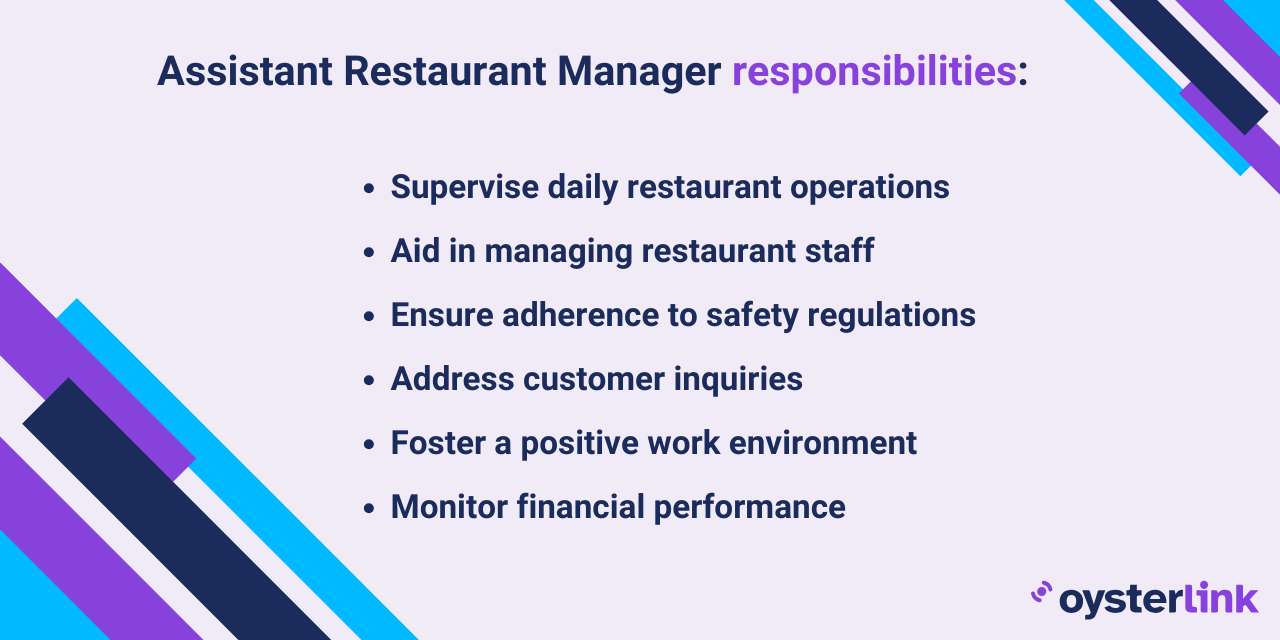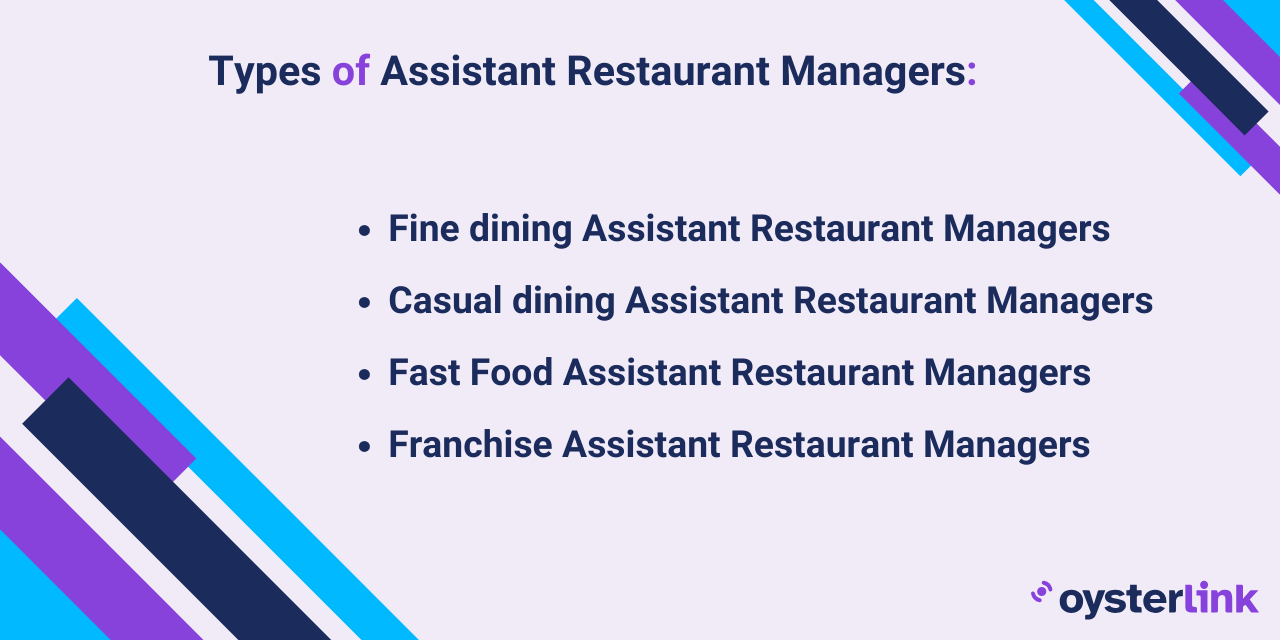Guide to an Assistant Restaurant Manager Career
Becoming an Assistant Restaurant Manager is an excellent way to progress in the hospitality industry.
This role pays well compared to other front-of-house roles such as Host/Hostess. It is an excellent stepping stone to more senior roles such as the Restaurant Manager role and anyone looking to become a Director of Restaurant Operations.
Our Assistant Restaurant Manager career overview will tell you everything you've ever wanted to know about this role. If you're thinking about becoming an Assistant Restaurant Manager, use this guide to see the ins and outs of this role.
What Is an Assistant Restaurant Manager?
The Assistant Restaurant Manager is someone who's in charge of the restaurant and oversees most day-to-day operations. They are second only to the Restaurant Manager and they take over during the Restaurant Manager's absence.
Think of the Assistant Restaurant Manager as the most versatile employee in the restaurant. They deal with both staff and customers, making sure restaurant activities remain uninterrupted.
What Does an Assistant Restaurant Manager Do?
The Assistant Restaurant Manager's main job is to manage the restaurant and its staff. They must ensure that there are no operational delays or internal conflicts and that the customers are happy.

The duties of the Assistant Restaurant Manager can be subdivided into duties regarding the employees, the customers and the operations of the restaurant itself.
Main Tasks of an Assistant Restaurant Manager
Most Assistant Restaurant Managers like to joke that no two days are the same in their profession. However, some of their core duties and responsibilities are:
- Supervising daily operations of the restaurant
- Scheduling shifts
- Assigning tasks to front-of-house staff members
- Opening and/or closing the restaurant
- Recruiting and training new front-of-house employees
- Answering customer questions
- Dealing with customer complaints
- Balancing cash registers
- Overseeing payroll
Top 4 Assistant Restaurant Manager Skills and Qualities
To become an Assistant Restaurant Manager you should possess these four skills above all else:
1. Verbal communication
If you become an Assistant Restaurant Manager, you'll spend most of your day communicating with staff to delegate tasks and resolve conflicts. You'll need to give clear instructions and be able to solve issues as they arise.
A good portion of your day will be spent answering customer questions or taking feedback/complaints. This requires having excellent verbal communication skills and a trustworthy character.
2. Attention to detail
The Assistant Restaurant Manager has to have amazing attention to detail. Nothing should go unnoticed by them.
Quality control and adherence to health and safety regulations both fall under the Assistant Restaurant Manager's jurisdiction. A keen eye can spot issues in these areas and address them sooner rather than later.
Because the Assistant Restaurant Manager is also responsible for inventory management and supporting payroll, being good with numbers is another major benefit.
3. Time management
Restaurants are busy and hectic most of the time. For an Assistant Restaurant Manager to thrive, they have to manage their time well and keep a tight schedule.
Since their responsibilities basically call for juggling between different tasks — most of which are time-consuming — a great Assistant Restaurant Manager has to know where he should focus his attention and when.
4. Teamwork and collaboration
Teamwork among employees is vital in most jobs, but nowhere is this more apparent than in hospitality. Without collaboration and communication, a restaurant can't function.
This is where the Assistant Restaurant Manager comes in. By leading by example, such as delegating tasks or helping out wherever needed, the Assistant Restaurant Manager can create a collaborative team environment where everyone has to contribute equally.
How To Become an Assistant Restaurant Manager: Education and Training Requirements
Becoming an Assistant Restaurant Manager typically requires a combination of education, experience and skills.
The first thing you'll need to have is experience in the restaurant industry as a front-of-house staff member. Very few companies would hire a complete industry newbie as their Assistant Restaurant Manager.
Here are some of the most common jobs that people have before transitioning into an Assistant Restaurant Manager:
Although having formal education is often not a prerequisite for getting a job as an Assistant Restaurant Manager, some employers value candidates with relevant certifications (such as a Food Safety Manager Certification).
Here are five certifications and courses for Assistant Restaurant Managers you can complete to gain valuable skills and knowledge.
Read our Assistant Restaurant Manager job description to learn what skills and education level employers prefer in greater detail.
Assistant Restaurant Manager Wage and Earning Potential
The average base salary for an Assistant Restaurant Manager in the United States is $24.41 per hour. You can see how Assistant Restaurant Manager salaries vary in our in-depth salary guide.
Where Do Assistant Restaurant Managers Work?
Assistant Restaurant Managers can work in various establishments, ranging from small, family-owned restaurants to large hotel chains.
Here are some common establishments where you can work as an Assistant Restaurant Manager:
- Restaurants
- Hotels and resorts
- Private clubs and membership lounges

What Is the Workplace of an Assistant Restaurant Manager Like?
The short answer is: hectic and fast-paced. There's very little downtime when managing a restaurant, and the Assistant Restaurant Manager is always busy doing something.
If you don't mind an environment where you have to be on your toes most of the time, you will likely enjoy being an Assistant Restaurant Manager.
Pros and Cons of Being an Assistant Restaurant Manager
Just like any other job, being an Assistant Restaurant Manager has its pros and cons. Here are some of them.
Pros:
- Career development. You can work your way up the corporate ladder into a more senior role.
- Potential for bonuses and promotions. If you're meeting your KPIs, you can always get a hefty payout in the form of a bonus.
- Networking in the hospitality industry. Meeting people in the industry could help you further down the line when you're looking to switch companies or even careers.
- Flexible working hours. You won't have to work a regular 9 to 5 shift, so you'll have plenty of flexibility when it comes to your schedule.
Cons:
- Long working hours. Even though your schedule can be flexible, you'll still have days where you might need to stay even after hours.
- Physical strain. This isn't an office job, so expect to be on your feet running a restaurant all day.
- Risk of burning out. If you can't handle pressure and stress, you might burn out rather quickly in this role.
- Constant need for adaptability. You'll have to adapt to new scenarios and deal with new issues every day, so this is something you'll have to be comfortable with.